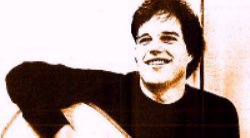A Fast, Sweet 12-String Serenade From the Oblivion Label
by Jim Jerome
Leo Kottke shuffles slowly through the doorway of the darkened 7th Avenue restaurant from the sunny sidewalk at lunch hour. He looks half asleep after his flight from Minneapolis for a concert that night. Dressed in a rumpled green corduroy suit, yellow button-down shirt and tennis sneakers, Kottke looks much more like a Big Ten fraternity football star than the incomparable acoustic guitarist that he is. His eyebrows quiver and he squints to adjust to the dimness as he recalls parts of his career: "My first two albums were on the Oblivion Label, fittingly enough."![]()

|
Kottke's wryness is as crisp and cryptic as his mastery of 12-string bottlenecking, and it's easy now for him to look back with humor and detachment. He has emerged from the undertow of obscurity as very possibly the finest solo guitarist around. With a half dozen lps and several TV rockshow appearances behind him, he is clearly the most successful and consistent. "There might be other guys doing what I'm doing," he admits, "but I'm just the only one with work."
That night's booking was just right for him: small audience, small house, lots of dedicated guitar freaks, and the main act. When he walked onstage, there was polite applause. He sat down on a high stool, cranked his right leg up just above his left knee, tuned up an amplified 12-string, set his fingers into the three picks, and without warning soared straight into "June Bug," one of his most recognizable pieces.
Dozens begin to clap in time, but just as suddenly as eh sucked them all into the sweet bottleneck slides, he loses them by shifting rhythms. There are yelps of delight arching throughout the dark hall and the clapping dies. Most of the people in front rows have, by the end of the piece, wiggle to the edge of their seats, straining to see exactly how he does it. Kottke has shown them that his mastery, like his wit, is not a handclapping experience in 4/4 time.
"My first music was on the violin," Kottke recalls, inadvertently burning his mouth on clear broth the next day after "smoking my lunch."
"I got bored, though I was supposed to have a good wrist. That was second, third grade. All that music was crud. So I tried for the flute after that. We were living in Cheyenne then. This guy told me I couldn't play because my mouth was too big. So he asked me: 'Would you like to try the tuba?' That was ridiculous. but I played it anyhow. I spent years on it and went to a couple of those State Fairs where you play for three or four judges sitting out there in the dark balcony, drinking or whatever they do to get through those things. Still it was important to get your superior rating. I got knocked down to mediocre because of the awful crap I played.
"The whole point of all this," he muses, scratching his hair trying to connect the threads, " is that I've stuck with the guitar and enjoyed it only because I didn't ever have somebody telling me what to do. I never took lessons or taught myself to read."
Kottke finally strayed into guitar and open (C and G mainly) tunings via the banjo when his father, a V.A. administrators, moved the family to Virginia. Out of bluegrass, banjo, Pete Seeger and Fred Gerlach records Kottke evolved a highly personalized concept of the guitar. He executes leads, rhythms, bass, melodies with mesmerizing speed, clarity , precision and stamina whether is playing folk, hillbilly, classical, jazz or country riffs.